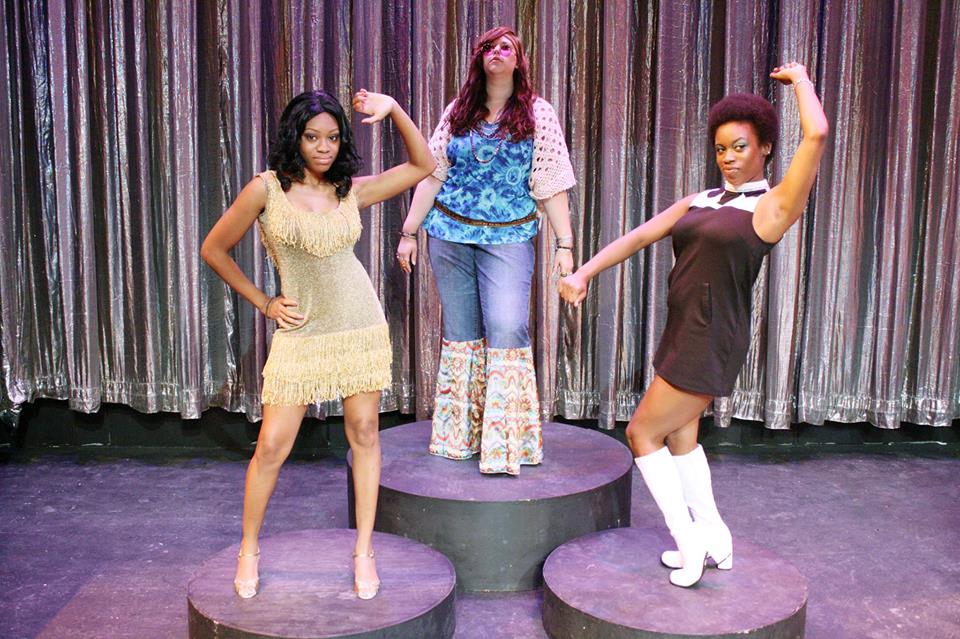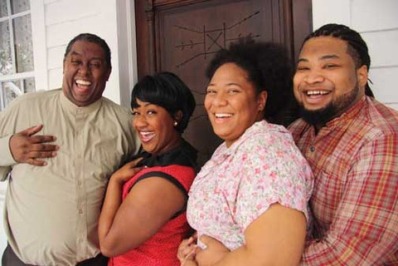“There’s a face that we wear in the cold light of day.
It’s society’s mask, it’s society’s way,
But the truth is that it’s all a façade…”
-Jekyll And Hyde: The Musical
When Frank Wildhorn penned the above lyrics for his adaptation of the classic tale of The Strange Case Of Dr. Jekyll And Mr. Hyde over two decades ago, he probably didn’t anticipate them being used in the introduction of a review for a yet-to-be-written play about a family staging an intervention, but the song has been stuck in my head since seeing Friday night’s performance of Robert O’Hara’s Barbecue. As usual, Trustus Theatre has selected a multi-layered, thoughtful, and well-crafted piece of work to open the 2017-2018 season. It also happens to be hilariously funny at times, especially early on, as we are introduced to a series of social misfits gathering for a cookout/confrontation in hopes of persuading the meth-addicted Barbara (Christine Hellman and Devin Anderson) to get the help she desperately needs. Known also as “Zippity-Doo”, Barbara is the loosest cannon on a full deck; her would-be rescuers each have substance and/or personal issues, and the family is a nigh-stereotypical dysfunctional, lower-middle-class bunch.
It would be impossible to adequately review the performance without revealing a few spoilers, so if you want to go in completely blind, stop reading now and take my word that Barbecue is well worth your time and money.
If you’re still reading, I promise not to give away all of the surprises, but to avoid confusion, I’ll go ahead and say that each role is double-cast, with one family entirely African-American, the other entirely white. The two families are identically named and costumed, with only minor (or so it seems) differences between them. Both Barbaras are addicts, and the set-up for the intervention, etc., utilizes almost identical dialogue, with a few cultural colloquialisms and stylistic choices unique to each group. The first act alternates scenes between the groups, with a fairly close-to-real-time overlap until a big reveal at the end of the first act, at which point we realize that we’re watching a reality show onstage. (The TV series Intervention is actually mentioned several times). But which “reality” is real? Over drinks at intermission, several friends and I guessed what would happen as well as what was going on. We were all incorrect, which illustrates the artistry of the playwright in avoiding the obvious in a play populated by what seem at first to be two-dimensional characters.
The show opens with a laugh-riot, profanity-laden, monologue by Christopher Cockrell as Barbara’s n’ere-do-well brother, James T., who wants nothing to do with any of it, yet is forced to set up for the party alone. Having seen Cockrell mostly in dramatic, serious roles, I was most impressed with his flawless comedic timing, as well as his ability to convincingly play a lowbrow redneck. It’s always enjoyable to see familiar faces in roles outside their personal norm, and Cockrell’s James T. is just that. Matching Cockrell’s stage presence and skill, Kendrick J. Lyles appears as the black James T., who, while slightly more laid-back, is the same scruffy, beer-swilling schlub as his white counterpart. One has a mullet, the other dreadlocks, but they’re both reluctant, unimpressed with the plan, and would rather be anywhere else.
Krista Forster and LaTrell Brennan share the role of Barbara’s sister, Marie, who has plenty of her own secrets. As with Cockrell and Lyles, both performers manage to create the same character with just enough differences to keep things interesting. While each Marie is self-serving and hypocritical, Forster’s is a bit more aggressive somehow, with Brennan’s interpretation bringing out a slightly softer side. Rather than being a distraction, this adds another layer to the almost-but-not-quite-identical nature of the two families. One gets the idea that Marie is following fairly closely in Barbara’s footsteps, which is supported by slight differences in the two Barbaras that mirror the personality of each Marie. Kudos to director Ilene Fins for weaving such subtleties into the parallel universes.
Trustus mainstay Elena Martinez-Vidal plays the white incarnation of Aldean, a chain-smoking opioid addict who is battling breast cancer. With her edgy, crass, and selfish nature, Aldean could easily be the most-disliked of this crew of undesirables, but Martinez-Vidal brings a raffish lovability to the role. She’s the cranky old aunt or neighbor lady whose nastiness is somehow endearing. Her counterpart, Mahogany Collins, is just flat-out hateful, with hilarious results. In the hands of a less skilled actress, this approach could have fallen flat, but Collins brings such sincerity to Aldean, you can’t help cracking up at her most venomous lines. This was my first time seeing her onstage, and I certainly hope it won’t be the last.
Two more familiar faces on the Trustus stage, Dewey Scott-Wiley and Marilyn Matheus, provide what semblance of stability the family has in Lillie Anne, the harried organizer and driving force behind the intervention. It goes without saying that each of these seasoned pros turns in a solid, well-developed performance, but as an added layer to an already complex set of circumstances, the two Lillie Annes also helped define each family. Each has seen tragedy and loss, but seemingly from different directions. With Scott-Wiley’s Lillie Anne, there’s a slightly frantic quality which suggests a family in decline, while Matheus’ solid, no-nonsense Lillie Anne has the aura of someone who has pulled herself up beyond her beginnings. The script does not address the issue, but the performances suggest one person who is desperately trying to fix something broken, while the other is calmly determined not to let things get any worse.
And of Barbara, herself? Well, that’s where things get complicated, and (SPOILER ALERT!!!!) once we discover that Hellman’s is the actual Barbara, the story splits open, and we see Anderson in her true identity: a successful singer who plans to conquer Hollywood by bringing Barbara’s story to life onscreen. (While in rehab, Barbara wrote a best-selling book about her experiences). In one of the show’s strongest scenes, the two play a game of cat-and-mouse over identity and reality, with Barbara claiming to have made up the entire story, which doesn’t seem to matter at all to the singer, who has her eyes on the Oscars and nothing else. Without giving away too much, I’ll just say that everything from race to sexual identity is addressed in the scene, with the overwhelming message being that reality is subjective and what you see isn’t always what you get. By the end of the scene, the two have merged in a way, and the audience is left wondering how many layers of deception and fakery just occurred, and if a “real” Barbara has faded into a pastiche of lies and re-writes. Hellman and Anderson manage to create just enough doubt about…well, almost everything. Watching their interaction and the game of one-upsmanship literally had me on the edge of my seat and figuratively doubting my sanity as each “revealed” something that may or may not have been true.
By the end, all is made clear, but the path takes several more twists along the way, dropping in one or two more revelations that tie the two worlds together. The final moment of the show (which I won’t reveal) brought laughter from some, gasps from others, and a whispered-but-distinct “daaaaaaaamn” from someone in the row behind me. For a script which addresses and bases itself on relativism and skewed perspective, I can think of no better reaction. Barbecue is a fresh, thought-provoking, mind-twisting, funny, vulgar, and intelligent piece of theatre, with a strong cast and ambiguous storyline that leaves you scratching your head a little. It’s a perfect show for Trustus, and Artistic Director Chad Henderson is clearly committed to continuing the theatre’s goal of bringing new works of high quality to the stage. His opening night welcome to the audience included a tribute to his mentor, the late Jim Thigpen, whom I have no doubt would have taken great pride in Barbecue.
Frank Thompson is a graduate of The University of Alabama and Cumberland School of Law, who has made his home in Columbia since 2010. He has performed, taught classes, and/or directed with several local theatres, and co-writes a column for "The Good Life" blog for Goodwill Industries, along with his wife, Laurel Posey. His essay, 'Que, was featured in the 2014 edition of Fall Lines by Muddy Ford Press.







